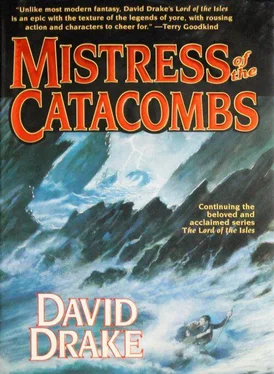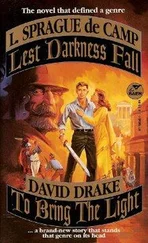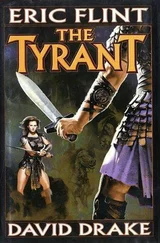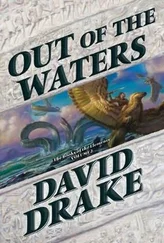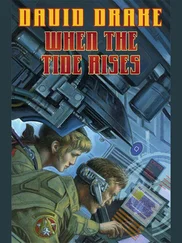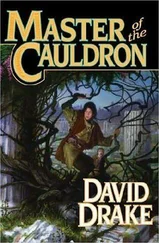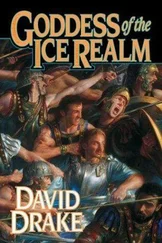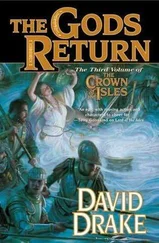Ilna breathed deeply. Her legs were trembling; for a moment she wasn’t sure the big muscles of her thighs would continue to hold her. Chalcus held out his left forearm for her to grab the way she would have gripped a railing. She took it and felt her body return to normal.
“You saw what he did to me,” Ilna said, her eyes on the ground. Seeing that Merota had grounded her again in a world where duty constrained Ilna os-Kenset more straitly than ever chains did a prisoner. It was a safe world, a world she knew well enough to feel comfortable in. There was nothing Ilna feared more than herself and the things she might do if unconfined.
And there was nothing she regretted more than the things she had done when she put her skills at evil’s service and was governed only by anger and her own cold logic.
“I heard him,” said Chalcus. “I’ve left men lying in their guts for less, dear one. But not you, not that way.”
“I’m sorry,” Ilna whispered. “I was so angry that I wasn’t…”
She laughed, surprising herself but not—from his expression—Chalcus. “I was so angry that I was myself,” she corrected herself. “And that’s a thing I try not to be very often.”
Ilna reached toward the silent Merota and, holding the girl, hugged Chalcus as well. There was as little give to his flesh as there was to a brick wall. Merota squeezed back fiercely.
They stepped apart. Chalcus eyed the small building now ringed by Blood Eagles, the conference room into which Garric had disappeared with the three women. The other women.
“Dearest…?” he said in a bantering tone. At any other time Ilna would have snapped at him for the word, but not now. “Don’t ever use your art to kill someone you care for. Use that little knife you carry, if you must. Or better—”
He grinned at her. There was no expression at all in his gray eyes.
“—use me. It’s a thing I’ve a talent for.”
The crowd of civilians across the watercourse was beginning to break up into lesser groupings. Each pair or handful chattered among itself as people went off to tell others about the wonders they’d witnessed—and likely, from Ilna’s experience of human beings, telling about many things they hadn’t witnessed.
Ilna brushed the thought aside, angry at herself for what she’d tried to do. “No,” she said. “I’m not so great a fool as that; at least when my friends see to it that I’ve time to think. Garric’s a clever man and a wise one. He’ll have had a good reason for whatever he chose to do.”
“Ilna?” Merota said, perfectly the lady now despite her garb and hair tousled from running. “You saw Garric being threatened, and now he’s acting funny. Couldn’t that be because of the danger you saw?”
Ilna looked at the girl coolly. “You were listening to me and Chalcus when you should have been about your lessons,” she said. She paused, then continued, “And a good thing, too, since you’ve obviously got better sense than I do.”
Her eyes met those of Chalcus again. “You both do,” she said.
“Do you care to wait here, Mistress Ilna,” Chalcus said. “Or shall we—”
The door of the conference room opened. Tenoctris shuffled out, looked across the narrow stream, and said, “Ilna? Would you help me with a task, please? It may help us find your brother.”
“Of course,” said Ilna, hiking up her tunic skirts and jumping the channel. Spectators still in the neighborhood watched with renewed interest.
Garric came out of the building with Liane on his arm. Liane stepped away, glancing toward Ilna. Ilna froze where she’d landed.
Garric acknowledged Ilna with a nod, then put his fists on his hips and stood arms akimbo.
“Master Chalcus?” he called. “Will you talk with me now? Liane can take care of Lady Merota, for neither our business nor that of Tenoctris and Mistress Ilna is anything they should trouble themselves with.”
Chalcus looked at Merota. “Go on, Chalcus!” the girl said. “Liane and I will sit in the bower there”—she nodded to the ivy-covered frame of withies near the terrace of fountains—“and discuss Celondre’s poetry.”
She giggled, suddenly a child again. “Or something.”
Ilna gave the sailor a brief lift of her chin in assent. She didn’t know what was going on, but that wasn’t a new experience for her.
“I’ll be right glad to join you, prince,” said Chalcus, hopping the stream without seeming to prepare for the leap. “Indeed, I think we’ve matters to discuss.”
He sauntered toward Garric, grinning broadly when he saw the Blood Eagles tense at his approach. The officer in command leaned toward Garric, who waved him away with a curt syllable. Garric held the conference room door for Chalcus, then entered behind him and closed it.
Ilna sighed. Part of her wanted to squat here on the turf and see what her patterns told her, but no doubt she’d learn in good time. For now she’d help Tenoctris.
She smiled coldly. It was her duty, after all.
Tint crept up to the fallen structure, pausing midway to turn and stroke Garric nervously. He grimaced but didn’t let reflex jerk him back in disgust. The beastgirl had been frightened even before the snake; she was proceeding now only because Garric demanded that she do so. It wasn’t much to ask that Garric let her take a little reassurance in his presence.
The palms and jagged-leafed philodendrons which shaded the boggy clearing were so motionless in the still air that Garric had the feeling he’d stepped through the frame of a painting rather than being part of a real setting. There was a chittering and sudden swift motion behind him; his heart leaped. A flock of bright yellow finches burst through the foliage and wheeled away again as suddenly.
“Stone and ring here, Gar,” Tint said, pointing to a corner of the ruin. “Under wall. You dig from side, not touch mushrooms.”
She hadn’t started at all when the birds fluttered past. They were harmless, after all….
Garric smiled faintly and patted Tint’s shoulder; she licked his hand. That was disconcerting, but it no longer irritated him.
He looked at the fallen wall. The orange puffballs grew only on the stones, bright blotches that punctuated the mosses and the original gray surface. If the builders had buried a statue as part of a foundation course to keep the new structure from sinking into the bog, Garric ought to be able to reach it by tunneling into the soft soil.
If it was there. And if it had the ring.
“Tint,” Garric said, “how do you know the statue you smell is the one that has the ring?”
The beastgirl shrugged. “Men find stone feet,” she said, gesturing back the way she’d brought Garric. “Writing on stone. Vascay say, ‘Find rest of statue.’ Stone under there smell same as stone feet.”
She scratched the middle of her back absently, a multijointed motion that startled Garric almost as much as the finches had. “Gold with stone,” Tint added. “Maybe ring, maybe not ring.”
Garric probed the ground with his finger. Water gleamed in low spots in the soil, drowning even the moss. He didn’t see how Tint could actually smell objects through that, let alone discriminate between particular veins of marble and types of metal.
But it was easier to believe that than to imagine the beastgirl either wanting to lie to him or having enough intelligence to carry it off. “Then I’ll dig,” Garric said.
It struck him suddenly that he had no tools or clothing whatever. Granted the ground was soft…
Garric looked around, chose a palm sapling whose trunk was only two fingers broad, and pulled it upward. It came easily, but the mat of surface roots at the end would make a better broom than a digging implement. Maybe he could chop or crush the staff into some sort of point?
Читать дальше
